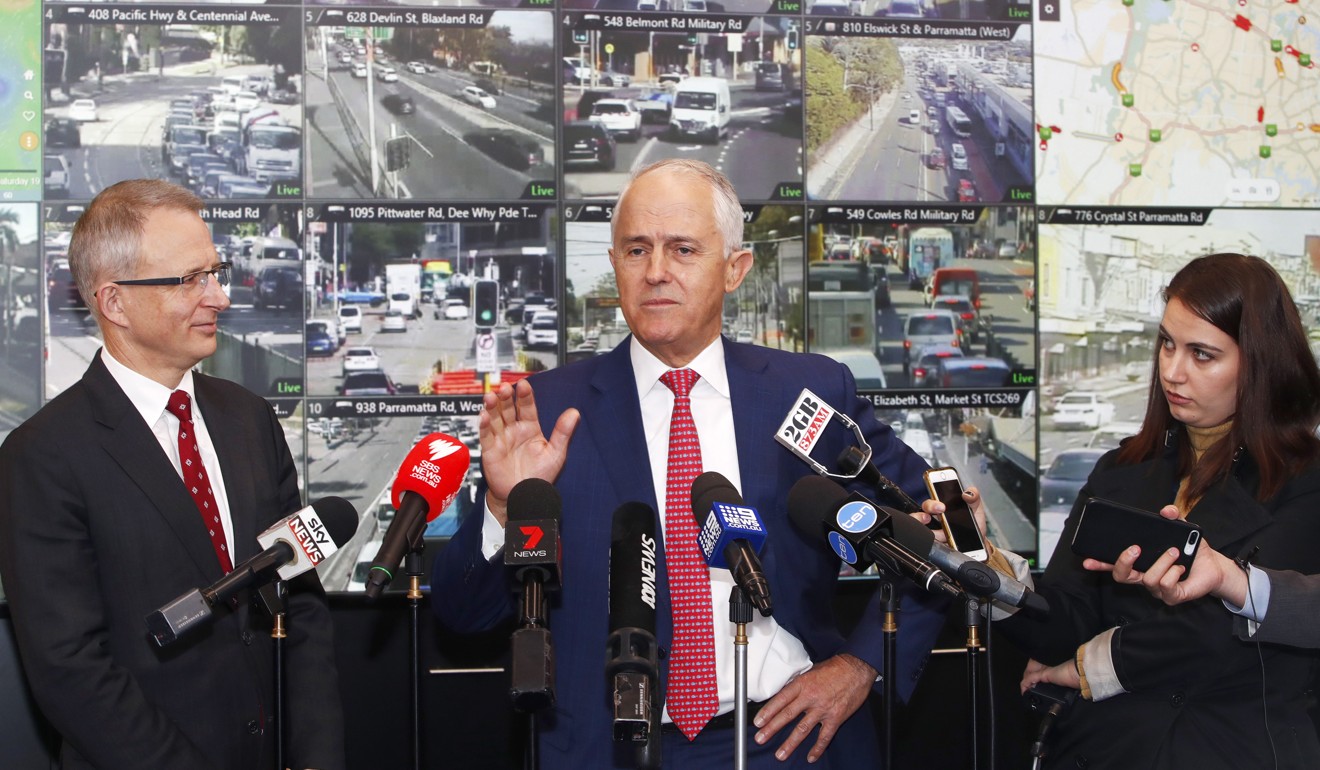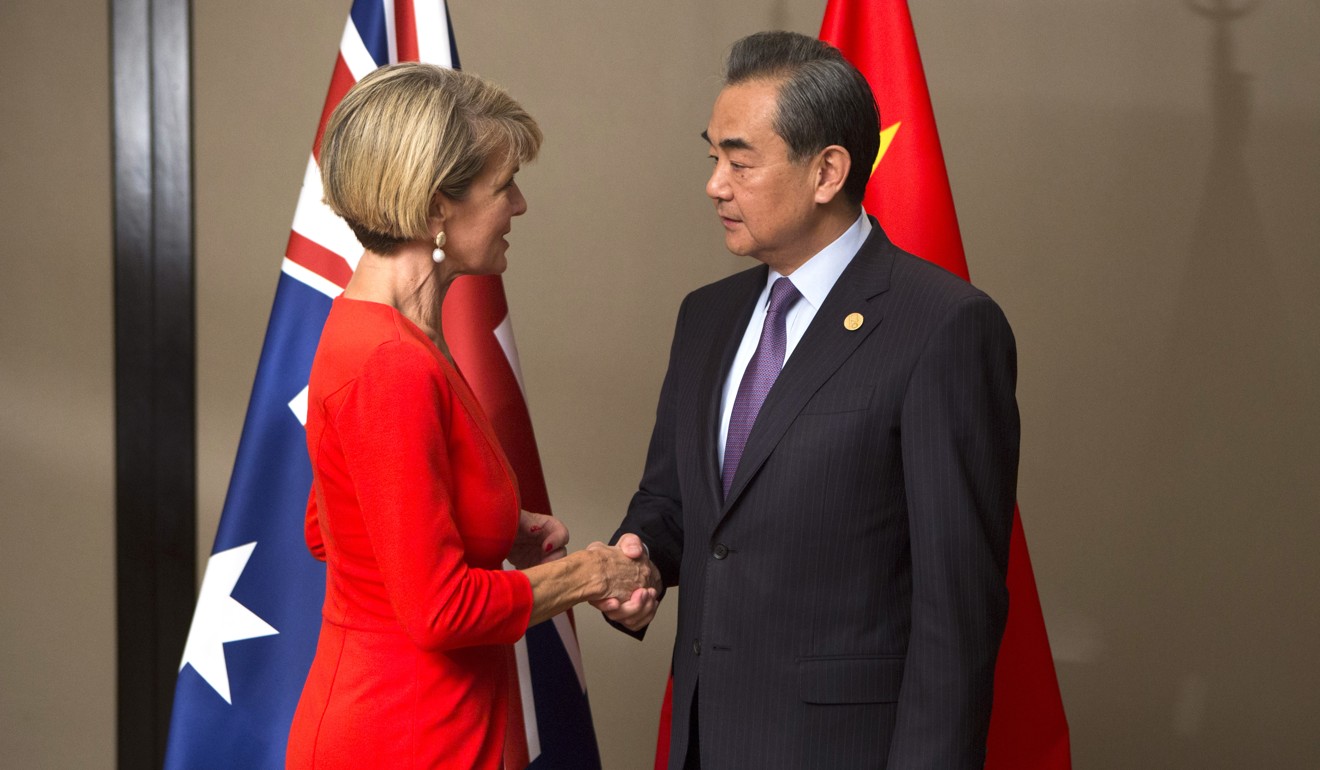
Australia must ask: does America have the power or resolve to stop China’s rise?
Hugh White says that after a 2017 where Australia tried prodding the US into doing more to counter China in the Asia-Pacific – to Beijing’s ire – Canberra is now attempting to talk things down. Australia faces some hard questions if it wants to build a sustainable relationship with the new China

Australia has long walked a tightrope between the United States and China, and now is in danger of falling off. Canberra’s balancing act went wobbly for all to see this week after a meeting between the two countries’ foreign ministers. When Australia’s Julie Bishop described it as “very warm”, China’s Foreign Ministry bluntly contradicted her. Australia needs to take off its “coloured glasses” if the relationship is to “return to the right track”, its spokesman warned.
China’s impatience is hardly surprising. Ever since 2011, when Barack Obama, in Canberra, announced Washington’s intention to resist China’s challenge to US regional leadership, Australia has been pursuing a policy of studied duplicity in its relations with both powers.
It has been assuring Washington that it fully supports US efforts to resist China’s ambitions and preserve the US-led order, despite the huge increase in China’s wealth and power. At the same time, it has been trying to convince Beijing it is doing nothing of the sort.
Both relationships are essential to Australia’s vision of its future. China is not just Australia’s biggest trading partner, but the biggest source by far of economic opportunities in the decades to come. The alliance with America is not just the bedrock of Australia’s foreign policy and guarantor of its security, but an essential element of Australia’s identity as a Western outpost in an Asian hemisphere.

Washington naturally expects Australia to step forward boldly to support America as it confronts and resists China’s power and ambition. But Beijing equally expects Australia not to take America’s side, because that was what former prime minister John Howard promised when he laid the foundations of Australia’s economic relationship with China in 1996.
This promise was easy to keep as long as America and China were not obvious rivals. But as the contest between them for leadership in Asia has become increasingly overt, Canberra’s struggle to walk both sides of the street has become more and more fraught.
Political leaders in Canberra have tried to reassure Australians that all is well, telling them that Australia doesn’t have to choose between America and China. But this has always been more an expression of hope than a statement of fact. They have tried to convince themselves that the US-China rivalry will dissipate once America somehow convinces China to back off willingly and peacefully, leaving America’s regional leadership uncontested.
Watch: Chinese navy conducts drills in East China Sea
But this was never realistic, and has become harder to cling to. China under Xi Jinping looks very unlikely indeed to back off, and America under Donald Trump looks utterly unable to respond effectively to China’s pressure.
It has been Trump’s election and his conduct as president that has brought things to a head for Canberra and precipitated the current crisis in Australia’s international relations. Trump’s “America first” campaign platform, the bitterly divisive impact of his election on American politics and the chaotically dysfunctional working of his administration have made Canberra question, for the first time, whether America could really be relied upon to keep China peacefully in check.
It soon ramped up its warnings about China, risking Beijing’s ire, in hopes of nudging Trump to recommit to the defence of America’s position in Asia. Within months of Trump’s inauguration, both Bishop and Prime Minister Malcolm Turnbull delivered major speeches in which, for the first time, they spoke frankly of China’s regional ambitions and committed Australia to opposing them.
These speeches clearly displeased Beijing, without having any perceptible effect in Washington. By the time Trump concluded a lengthy visit to Asia last November, it was clear that his administration had no coherent plan to confront China’s regional ambitions.
In Australia, this was followed by an outbreak of panic about China’s growing power and influence, fuelled by well-publicised allegations of systematic Chinese interference in domestic politics. The government in Canberra went a long way towards endorsing some of these allegations, and in an atmosphere tinged with political opportunism and xenophobia, it rushed forward proposals for new laws to curtail such activities.
Watch: Tough message from Australian Prime Minister on Chinese interference
There is no question that Australians should be aware of, and concerned about, the massive influence China can bring to bear on countries around Asia, including their own. But this ill-considered initiative did little to address the real problem, and prompted a predictable, painful response from Beijing, which swiftly imposed a bar on almost all ministerial-level contact between the two countries and apparently took steps to slow some Australia exports to China.
Since then, Canberra has been busy denying publicly that there is any serious problem, while at the same time trying desperately behind the scenes to assuage Beijing’s anger. It has tried to claim – absurdly – that the measures announced last year were not directed at China, when the government’s statements at the time clearly showed they were.
It has also stepped back from the tough warnings last year about China’s strategic ambitions, and instead of pressing Washington to take China on, is now trying to talk things down. For example, when Washington’s new national security strategy described China as a strategic rival, Turnbull and Bishop pointedly disagreed.

Unfortunately, as this week’s wobbles have shown, Beijing has not been impressed by any of this. Some have suggested that the only way for Canberra to fix the problem is to sack the foreign minister, but just changing the messenger will not be enough. Canberra has to think much more carefully about the message itself.
It can no longer keep pretending that it doesn’t have big and difficult decisions to make. Is it willing to accept that China will in future provide a much bigger leadership model in Asia? Is it prepared to sacrifice its economic relationship with China by opposing Beijing’s ambitions? Does it seriously believe that America has the power or resolve to solve Australia’s problem and stop China’s rise?
Only by bravely facing these uncomfortable questions, and finding realistic answers, can Australia build a sustainable relationship with the new China.
Hugh White is professor of strategic studies at the Australian National University in Canberra